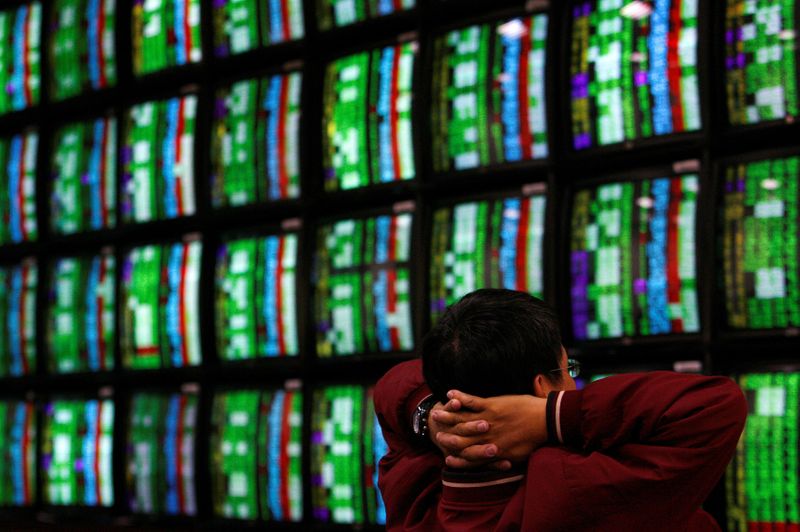

© Reuters. FILE PHOTO: A man looks at stock market monitors in Taipei January 22, 2008. REUTERS/Nicky Loh/File Photo
By Scott Murdoch
HONG KONG (Reuters) – Asian share markets weakened sharply in late trading Tuesday, giving up earlier gains as investors worried the Omicron variant will prove more resistant to vaccines and could cause more widespread global economic disruption.
The region’s trading followed a brighter lead from Wall Street on Monday which reacted positively to news from U.S President Joe Biden that new lockdowns https://www.reuters.com/markets/europe/wall-street-rebounds-after-virus-linked-sell-off-2021-11-29 as a result of the variant were off the table for now.
Positive sentiment though was replaced swiftly with a sudden burst of risk aversion in most major asset markets across Asia after the head of drugmaker Moderna (NASDAQ:) told the Financial Times https://www.ft.com/content/27def1b9-b9c8-47a5-8e06-72e432e0838f that COVID-19 vaccines are unlikely to be as effective against the Omicron variant of the coronavirus as they have been against the Delta variant.
“It’s not good news, and it’s coming from someone who should know,” said Commonwealth Bank of Australia (OTC:) currency strategist Joe Capurso. “Markets have reacted in exactly the way you’d expect them to with and taking the brunt.”
Both the Australian and New Zealand dollars tumbled, with the Australian dollar at $0.7112, near it lowest in a year.
MSCI’s broadest index of Asia-Pacific shares outside Japan was 0.45% lower later on Tuesday after initially being up as much as 0.52%.
“In the near term, there is a lot of uncertainty and the markets are starting to price in some level of risk,” said Jack Siu, Credit Suisse (SIX:)’s chief investment officer for Greater China.
“Essentially the recovery should stay underway but we are in an environment of volatility.”
In Australia, the S&P/ASX200 closed up 0.22% after earlier being up 1.15%.
retraced all of its 1.2% gains notched earlier in the session and turned negative later on Tuesday.
Hong Kong’s shed 1.86% while China’s blue chip CSI 300 index was off 0.3%.
Selling in Hong Kong was exacerbated by the Hang Seng falling below a strong technical support level of 24,000, according to analysts.
In early European trades, the pan-region were down 0.63% at 4,080, German were down 0.43% at 15,209, futures were down 0.43% at 7,084.5. U.S. stock futures, the , were down 0.53% at 4,634.3.
“Investors are still trying to digest what the new variant could mean in terms of of any policy response … will there be new restrictions, lockdowns and any impact for monetary policy,” said Alex Wolf, JP Morgan Private Bank’s head of investment strategy for Asia.
Activity in China’s services sector grew at a slightly slower pace in November, official data showed on Tuesday, as the sector took a hit from fresh lockdown measures as authorities raced to contain the latest outbreak.
The official non-manufacturing Purchasing Managers’ Index (PMI) fell to 52.3 in November from 52.4 in October, data from the National Bureau of Statistics (NBS) showed.
Some investors are still cautious about the impact Omicron could have in disrupting trade, travel and economic activity.
“There are so many unknowns about Omicron and the market has been jumping at shadows,” said James Rosenberg, a Sydney-based financial advisor at EL&C Baillieu said.
“After such a strong run and with elevated valuations the market will always be susceptible to the odd shakeout on news that could bring risk.”
Tuesday’s volatility came after the on Monday rose 236.6 points, or 0.68%, to 35,135.94, the gained 60.65 points, or 1.32%, to 4,655.27 and the added 291.18 points, or 1.88%, to 15,782.83.
In Asian trading, the yield on benchmark was at 1.4987% compared with its U.S. close of 1.529% on Monday.
The two-year yield, which rises with traders’ expectations of higher Fed fund rates, touched 0.5039% compared with a U.S. close of 0.51%.
Gold ticked higher in Asian trade to be $1,793.46 per ounce after weakening in the U.S. session on the back of the stronger equities markets.
dipped 1.93% to $68.6 a barrel. fell to $72.04 per barrel.